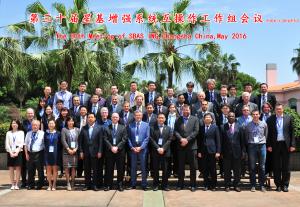Posted on: October 10, 2016

JPO participates at the 30th meeting of the Satellite-Based Augmentation System (SBAS) Interoperability Working Group (IWG-30) in Changsha, Hunan, China
This biannual meeting of IWG events took place on May 16th and 17th 2016. The main objective of the IWG meetings is to ensure seamless use of SBAS services through interoperable SBAS systems using common SBAS systems standards. The meeting gathered representatives from nine SBAS projects worldwide.This increased participation demonstrates growing interest in SBAS. Among the African stakeholders representing ongoing SBAS projects in Africa, were the EGNOS in Africa Joint Programme Office (JPO) and ASECNA (Agence pour la Sécurité de la Navigation Aérienne en Afrique et à Madagascar), a leading Air Navigation Service Provider covering 17 States in Africa. The Agenda of this 30th meeting covered various issues regarding harmonization of SBAS modernization plans, SBAS standards, R&D cooperation on key SBAS technologies, and joint SBAS promotion activities.
During the meeting, important information was shared regarding ongoing improvements of global navigation satellite system (GNSS) constellations and progress on the SBAS programs. Regarding the (GNSS) constellations, the launch of GPS Block IIF satellites, which are all in active service, and six satellites to be launched in 2016 for GALILEO were reported. The current status of the Chinese BeiDou programme and the ongoing works on the Japanese Quasi-Zenith Satellite System (QZSS) were also provided.
Regarding the SBAS programs, the European Union (EU) informed the meeting that the EGNOS LPV-200 service was declared on September 29th, 2015 with the first LPV-200 approaches flown on May 3rd, 2016. EU also reported an increased number of LPV procedures implemented in Europe currently totaling 261 and supporting 153 airports. Further, the EU announced potential early service capability for Category-1 (10-meter Vertical Alert Limit) service with partial GPS and Galileo constellations based on its planned EGNOS V3 with Dual Frequency Multiple Constellation (DFMC) SBAS capability. In the meantime, EGNOS V2 evolutions will continue with v2.4.2, which will have two releases in 2019 and 2020. The status and modernization plans of the SBAS and GNSS programmes were also provided with regard to MSAS-JAPAN, GAGAN-India, BDSBAS-China and KASS-Korea.
Regarding the SBAS programs in Africa, it was indicated that the ASECNA Programme includes ownership and provision for a system able to support RNP APCH operations with limited L1 capability in 2019/2020 and L1/L5 capability in 2023. In addition, ASECNA reported that the ‘SAGAIE’ project experiments with the French government space agency, Centre National d’Etudes Spatiales (CNES), which deployed Global Navigation Satellite System (GNSS) stations in the ASECNA area, showed good availability results using the EGNOS v.2.4.1M aided by additional ionosphere monitoring algorithm. The role of the EGNOS in Africa Joint Programme Office (JPO) as a support instrument to the harmonization of SBAS – EGNOS activities in Africa was also narrated. It was reported that, implementation of SBAS – EGNOS in Africa has a main goal of having African SBAS capabilities by 2025 through a modular approach. In this respect, availability of DFMC SBAS is anticipated to support this goal.
The event provided all participants with a unique opportunity to the updates on SBAS and GNSS programmes worldwide. More specifically, for JPO, information gathered will contribute to its support to all initiatives on the African side and ongoing implementation of the Programme ‘Support to EGNOS in Africa’. We believe that increased awareness of the IWG members on the SBAS initiatives in Africa and the ‘EGNOS in Africa Support’ Programme’ will contribute to the integration of Africa in the global SBAS and GNSS programmes’ coordination.